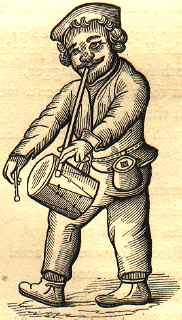Philip Henslowe and the Admiral's Men
Philip Henslowe earned fame and fortune as a theatrical entrepreneur. Henslowe was a shrewd businessman; as a young man, he married his employer's widow*, and he acquired considerable property in London, including some Bankside stews (brothels*).
During his theatrical and business career*, he kept a Diary, one of the most informative of the documents that survives from the period.
Henslowe's Diary
Henslowe's Diary, kept from 1592 to 1603, contains valuable information about the Elizabethan stage. The diary includes lists of performances and takings, records of transactions with players and playwrights and information about costumes and props. On his death, the diary passed to Alleyn, and is now kept in the library of Dulwich College. (See some entries from it.)
One odd chapter in the study of Shakespeare concerns attempts made to forge* entries in the Diary.
Footnotes
-
A pattern
In a similar move, Henslowe's principal actor, Edward Alleyn, married his wife's daughter, Joan Woodward.
-
Good business
Henslowe's other business interests included the manufacture of starch, bear-baiting, and pawnbroking. He was influential enough to gain Court appointments: in 1592 he became a Groom of the Chamber; in 1603 a Gentleman Sewer of the Chamber.
-
An active career
- In 1587 Henslowe built the Rose, the first theatre on the Bankside.
- In 1594 he owned the theatre at Newington Butts, to the south of the City of London.
- In 1600, with Edward Alleyn, he built the Fortune theatre.
- In 1604, jointly with his son-in-law, Edward Alleyn, he purchased the office of the Master of the Game of Paris Garden, where bears were baited.
- In 1613 they built the Hope theatre, used for both plays and baiting (see below).
- Henslowe died in 1616, four months before Shakespeare's death.
The Hope Theatre
The Hope was built in 1614 on the site of the Bear Garden. It was designed for both bear-baiting and plays, the stage to be "carryed and taken awaie, and to stande uppon trestles." The "heavens" over the stage--the roof--was to be supported without any pillars encroaching on the stage.
-
Forged "scholarship"
For a number of years in the early 19th century, the Diary was in the hands of the distinguished Shakespeare scholar, John Payne Collier. For Collier, however, informed speculation about dates and other details about Shakespeare was not enough -- he wanted "proof." One of a number of forgeries he indulged in to provide support for his pet theories was the alteration of the Diary. It has taken all the ingenuity of modern scholarship and technology to sort out what was Henslowe and what was Collier.
